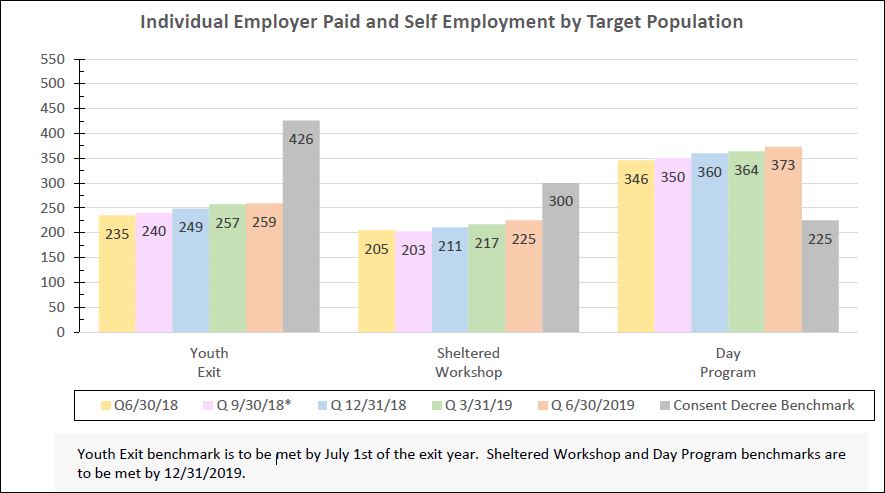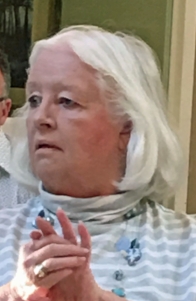New Olmstead Consent Decree Coordinator To Guide Court-Ordered ADA Compliance in RI
/By Gina Macris
Rhode Island is looking for someone to coordinate its compliance with a 2014 federal civil rights agreement affecting adults with developmental disabilities – for the sixth time in as many years.
The state created the position of Consent Decree Coordinator at the insistence of an independent court monitor who wanted someone with the clout to break through the “silos” of three departments of state government and hammer out an integrated response to the compliance steps in the agreement.
Since the spring of 2019, the position has been filled by Brian Gosselin, the Deputy Secretary of the Executive Office of Health and Human Services and its former Chief Strategy Officer.
Brian Gosselin
His tenure has been marked by controversy that has included a dispute – or misunderstanding, as Gosselin put it- over the independence of a community organization which was settled only by a letter from the U.S. Department of Justice.
Members of the community organization, the Employment First Task Force, have more recently described Gosselin’s consent decree work as “invisible.”
Now the state is under a court-ordered timeline to implement sweeping changes and it has decided to seek an independent contractor, reporting to Claire Richards, Governor Gina Raimondo’s Executive Counsel, to become the consent decree coordinator.
Louis DiPalma
The move won kudos from State Sen. Louis DiPalma, D-Middletown, the General Assembly’s most prominent watchdog on services for adults with developmental disabilities.
“I applaud the state, specifically Governor Raimondo, for elevating the position, by having the CDC (consent decree coordinator) report directly to her office, independent of any state agency,” DiPalma said in a statement.
However, Kerri White, Director of Public Affairs for EOHHS, said that the new consent decree coordinator will not be the first to report to the Governor’s Executive Counsel.
“The new Consent Decree Coordinator will continue to work with the established EOHHS, BHDDH, DHS and RIDE team but will have an avenue of escalation through the Governor’s Executive Counsel in order to maintain the compliance momentum achieved through the previous Consent Decree Coordinator,” White said in a statement.
She referred to the agencies involved in the state’s combined consent decree response, including the Department of Behavioral Healthcare, Developmental Disabilities and Hospitals (BHDDH), the Department of Human Services (DHS), and the Rhode Island Department of Education (RIDE), as well as the Executive Office of Health and Human Services, which supervisory authority over BHDDH and DHS.
White said both Gosselin and the first coordinator, Andrew McQuaide, have reported to Claire Richards.
Midway through McQuaide’s tenure, his position in the bureaucratic heirarchy was lowered, when he was transferred to BHDDH. Three successive coordinators, Mary Madden, Dianne Curran, and Tina Spears, all worked from EOHHS.
Madden, who succeeded McQuaide, and Curran, who followed Madden, both had “substantial interaction” with Claire Richards, White said. Spears succeeded Curran. Gosselin, who by that time had twice served as interim coordinator, took over from Spears.
The appointment of Gosselin as coordinator in 2019 sparked criticism in the community, most notably from DiPalma, who said the choice of a salaried employee with loyalties to the state posed a conflict of interest.
“If you’re working for the state, I don’t know how you work for the 4,000 people” the consent decree seeks to protect, DiPalma said.
At the time, an EOHHS spokesman said Gosselin would bring “stability” to the coordinator’s job, and the state’s principal lawyer for the consent decree case said it was immaterial, legally, whether the consent decree coordinator was a state employee or an independent contractor.
DiPalma agreed that stability was critical but said “no rationale has been given for why we have had five coordinators in the last five years.”
Later in 2019, members of the Employment First Task Force, a community-based advisory organization created by the consent decree as a bridge between the public and government, told the DOJ about a disagreement with Gosselin.
They said Gosselin had attempted to curb the group’s contacts with the DOJ unless a particular outreach attempt had state approval. The matter escalated, until the DOJ sent a letter to the state’s lawyers that clearly underscored the independence of the Task Force.
DOJ lawyers said they hoped the situation was indeed a misunderstanding, as asserted by the state. The letter went on to say that members of the Task Force are “independent stakeholders with a role in the successful implementation of the consent decree.”
“Indeed, any limitation on open communication would undermine the intended autonomy of the Task Force,” the DOJ letter said.
Until a few days ago, Nov. 17, it was not clear that the state was, in fact, looking for a new consent decree coordinator to succeed Gosselin.
Earlier in November, a BHDDH spokesman said that the state had not advertised for a consent decree coordinator but had sent out a posting to state-contracted temporary staffing agencies for “temporary project management support” to “help organize our pathway to 2024”. That is the year the consent decree is scheduled to expire, assuming full compliance is achieved. The opening was advertised from Oct. 19 to Nov. 9, a BHDDH spokesman said.
“The State recognizes and appreciates Brian Gosselin’s great work on the consent decree and the many other projects that he oversees in his role as Deputy Secretary & Chief Operating Officer for the Executive Office of Health and Human Services,” said the BHDDH spokesman, Randal Edgar.
“Our team structure will remain in place and our key points of contact for the Court Monitor and the Community will remain unchanged,” he said.
“The State team values all of the stakeholder partnerships and recognizes the need for responsiveness to stakeholder concerns,” Edgar said.
The project management job description appeared to be very similar, if not identical, to that of the consent decree coordinator.
After requests for clarification from Developmental Disability News, White, the EOHHS spokeswoman, said that to eliminate any confusion, the state planned to re-post the position with the title of Consent Decree Coordinator.
“Since we are using a staffing agency to hire the Coordinator, we were limited to a prescribed list of job titles from the third-party staffing search agency. We understand this has caused confusion,” White said in an email.
White said the staffing agency that provides the successful candidate will pay the new consent decree coordinator and then bill the state. The budget for the consent decree coordinator is $100,000 a year. That allocation has not been used since Gosselin was appointed consent decree coordinator. Gosselin makes $146,655 as deputy secretary of EOHHS, according to state payroll data.
He will remain in the coordinator’s post during the transition, White said.





























